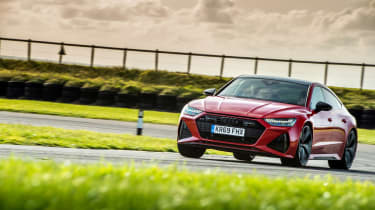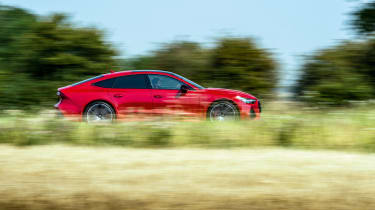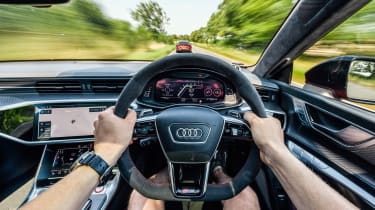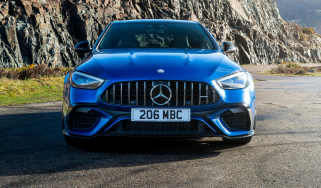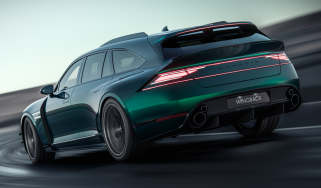Audi RS7 Sportback – long term test
We ran a second-generation RS7 on evo's Fast Fleet in 2020, and it left a lasting impression as an extremely fast do-everything family performance car
There were many times during the nine months with our Audi RS7 that when you let the (£650) power-close frameless door shut and sank into its diamond-stitched seat, a much-needed barrier between you and the outside world was formed, a calmness washing over you, secure in the knowledge that, a stage from the Group B era of the World Rally Championship aside, Audi Sport’s five-door coupe wasn’t going to be phased by anything it might stumble across.
Knowing you had the key to the telephone box red Audi to take you home at the end of a challenging day or a long flight rarely led to negotiations to swap into something a little more hardcore. The fastest of the Audi Sport coupes blended its violent performance with restrained sophistication and a chassis that made for not only one of the best driver’s cars Audi has produced outside of the R8, but one of the best supersaloons on sale, too. In short, there were more times than not when the RS7 proved itself to be worthy of its place on the evo Fast Fleet, even if there were some who would rather it had been an example of its more famous RS6 brother instead.
More reviews
> Click here for our full review of the Audi RS7
A number of things conrtibuted to the RS7’s great appeal. Its twin-turbocharged V8 lacked for nothing in the horsepower and torque stakes, with 592bhp and 590lb ft respectively. Wound up and let off its leash it could arrive at the horizon far quicker than any car the wrong side of 2000kg had any right to. Yet despite the V8’s willingness to rev to the higher echelons of its range, it always felt more natural when you operated around its mid-range, surfing that torque and dipping into the more flamboyant power when required rather than all the time.
A good supersaloon has always managed to deliver its sizeable performance advantage over its more restrained siblings without drawing unnecessary attention to itself and this was where the RS7 excelled. Its ability to clear slower traffic with such efficiency made the process not only effortless but also safe, your time exposed to danger reduced to the minimum. Add in the ability to run with the exhaust valves closed regardless of the engine mode selected and you could do so in relative silence, too.
Not that a Tango red RS7 blended in. In a more subtle shade it would have been far less overt and shouty, and a better match for the interior, which blended some fine materials with a design and ergonomics that just seemed to work. There was no standout element to why this was, it just did, with a simplicity that felt so natural.
While the seat didn’t drop you low in the cabin like those of a Panamera, you did feel you were sitting in rather than on the RS7, which added a great deal to the feeling of connection and isn’t always a given today. Only the lacklustre gearshift paddles let the side down. The powertrain responded so well to the driver using manual mode, the shift speeds snappy once you’d dived into the Drive Select software, but the paddles felt like cheap buttons rather than an extension to a sophisticated eight-speed gearbox; Audi needs to put a call in to Lamborghini’s supplier and order the Huracán’s paddles.
It’s what’s under the RS7’s skin that made it capable of stepping out of the shadows of its more famous rivals, though. Our example was equipped with the optional RS Sport Suspension Plus with Dynamic Ride Control and carbon-ceramic brakes, these two adding £11,000 to the car’s 2019 £97,090 list price, which includes four-wheel steering and a torque-vectoring rear differential as standard.
By ditching the standard air suspension in favour of fixed-rate springs and three-way adjustable dampers interlinked via diagonally opposed oil lines, KR69 FHX was the most dynamically tuned RS7 available. There was no trade-off in ride quality and the combined chassis tech resulted in a big, fast Audi that was genuinely engaging to drive. It didn’t make you work for the rewards or go looking for its ability, either, it was just always on. One minute you could be meandering along a high street, backside being chilled, V8 barely ticking over, the next you were alone on a road you know well and the RS7 was ready for whatever you threw at it. Alert, responsive, light on its 22-inch Pirellis; a car in complete control.
It had an unexpectedly welcome level of body control, it turned in with a keenness that’s lacking in the supposedly more dynamic RS4 and RS5 models, and its steering, especially in Dynamic mode, reacted exactly as expected with no surprises and none of the numbness and remote feeling of Audis of old. It always felt like a totally resolved car. Until it went on track, that is, where its bulk worked against it, turning a lithe road car into a rather blunt instrument, as we discovered at eCoty in 2019.
Then again, you wouldn’t buy an RS7 as a trackday car. You would, however, buy one if you were looking for a do-everything family performance car.
End of term figures:
| Date acquired | January 2020 |
| Duration of test | 9 months |
| Total test mileage | 7798 |
| Overall mpg | 23.8 |
| Costs | £15 (oil) |
| Purchase price | £138,725 |
| Value today | £80,000 |
This end-of-term report was first published in evo 282. For the latest issue and to check in with our current fast fleet cars, subscribe here or grab the latest issue in-store today.

